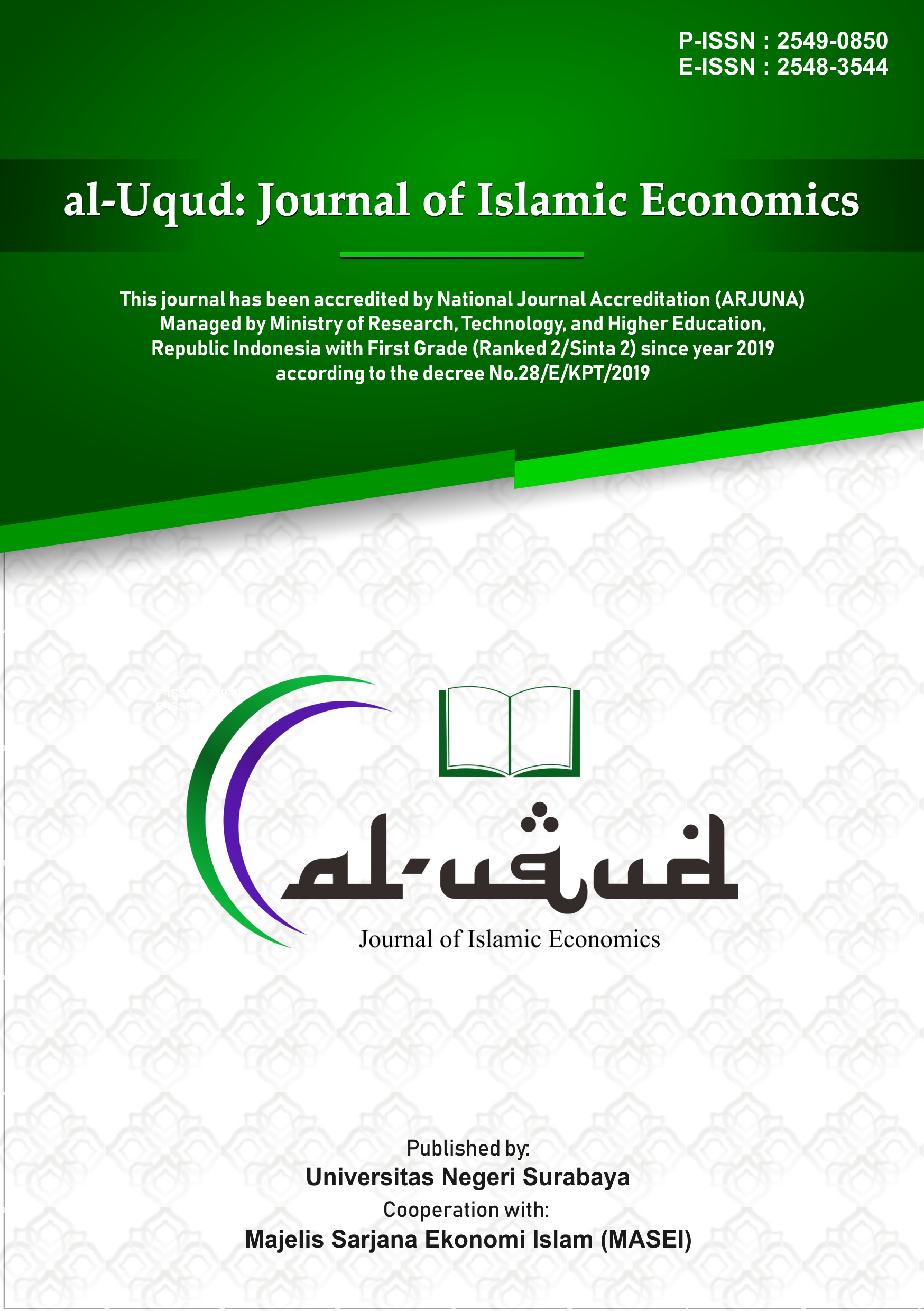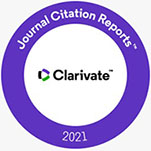Efficiency Analysis of Zakat Institutions Based on The Organizational Cluster in Indonesia: Free Disposal Hull (FDH) Approach
DOI:
https://doi.org/10.26740/al-uqud.v5n2.p218-233Keywords:
Efficiency, Free Disposal Hull, Zakat, Zakat institution, Good governanceAbstract
This study aims to analyse the level of efficiency of zakat institutions in Indonesia between 2014 and 2018. Zakat institutions are divided into three clusters based on the organisation's nomenclature: the government, public, and private groups. The division of these clusters aims to see differences in the management of zakat funds between each group. This study uses a quantitative research approach through the Free Disposal Hull (FDH) method to produce a more comprehensive average efficiency estimation than the Data Envelopment Analysis (DEA). The sampling technique is purposive, and there are fourteen research objects observed. The government cluster is the cluster with the highest efficiency value. The private set comes in second, and the public group comes in third ranking. The high score that the government cluster earns is due to their primary business purpose, which focuses on managing zakat funds. The results of this study can be used as references for the policy establishment of zakat institutions in Indonesia.
References
Ahamed, H., Hasan, K. T., Islam, M. T., & Galib, F. C. (2020). Lockdown Policy Dilemma: COVID-19 Pandemic versus Economy and Mental Health. Journal of Biomedical Analytics, 3(2), 3758. https://doi.org/10.30577/jba.v3i2.60
Al-Ayubi, S., Ascarya, & Possumah, B. T. (2018). Examining the Efficiency of Zakat Management: Indonesian Zakat Institutions Experiences. International Journal of Zakat, 3(1), 3755. https://doi.org/10.37706/ijaz.v3i1.66
Arif, M. (2017). Zakat as a Mode of Poverty Alleviation. Asian Journal of Multidisciplinary Studie, 05(11), 5765. https://doi.org/10.4172/2162-6359.1000473
Avkiran, N. k. (2004). Decomposing Technical Efficiency and Window Analysis. Studies in Economics and Finance, 22(1), 6191. https://doi.org/10.1108/eb043383
Decree of the Minister of Religion Number 333 of 2015 concerning Guidelines for Granting Permits to Establish Zakat Institutions, 1 (2015).
Dewi, S., & Setyorini, C. T. (2018). Efektivitas Tata Kelola Dana Zakat. Jurnal Akutansi Multiparadigma, 9(2), 346364. http://dx.doi.org/10.18202/jamal.2018.04.9021
Faturohman, T., Rasyid, M. F. A., Rahadi, R. A., Darmansyah, A., & Afgani, K. F. (2021). The Potential Role of Islamic Social Finance in the Time of COVID-19 Pandemic. Review of Integrative Business and Economics Research, 10(1), 95105. http://buscompress.com/uploads/3/4/9/8/34980536/riber_10-s1_10_u20-063_95-105.pdf
Fikriyah, K., & Ridlwan, A. A. (2018). The Evaluation of Mustahiq Empowerment-Based Poverty Alleviation Program at Amil-Zakat Organizations. International Journal of Islamic Business and Economics (IJIBEC), 2(1), 6573. https://doi.org/10.28918/ijibec.v2i1.1263
Hafidhuddin, D. (2007). Agar Harta Berkah dan Bertambah: Gerakan Membudayakan Zakat, Infak, Sedekah, dan Wakaf. Jakarta:Gema Insani.
Halimatusadiyah, I. (2015). Zakat and Social Protection: The Relationship Between Socio-religious CSOs and the Government in Indonesia. Journal of Civil Society, 11(1), 7999. https://doi.org/10.1080/17448689.2015.1019181
Hamidi, N., & Suwardi, E. (2013). Analisis Akuntabilitas Publik Organisasi Pengelola Zakat Berdasarkan Aspek Pengendalian Intern Dan Budaya Organisasi (Survei pada Organisasi Pengelola Zakat di Indonesia). Ekonomi Dan Bisnis Islam, 8(1), 1334.
Ismail, A. G. (2019). The Role of Goverment in the Era 4.0 Industrial Evolution. In IESTC Working Paper Series, Working Paper No. 14. Bangi: Organization of Islamic Economic Studies and Thoughts.
Kadir, A. (2010). Efektivitas Pengelolaan Zakat Di Bazda Kota Blitar Ditinjau Dari Uu Nomor 38 Tahun 1999. Jurisdictie Jurnal Hukum Dan Syariah Vol.1 No:2 12-2010.
Kahf, M., & Yafai, S. Al. (2015). Social Security and Zakah in Theory and Practice. International Journal of Economics, 23(2), 189215.
Kurnia, A. S. (2006). Model Pengukuran Kinerja dan Efisiensi Sektor Publik Metode Free Disposable Hull (FDH). Jurnal Ekonomi Pembangunan, 11(1), 120. https://doi.org/10.20885/ejem.v11i1.567
Murtadho, A. (2016). Strategi Pembangunan Ekonomi Yang Islami Menurut Fahim Khan. Economica: Jurnal Ekonomi Islam, 7(2), 122. http://dx.doi.org/10.21580/economica.2016.7.2.1153
Muttaqin, T., Wittek, R., Heyse, L., & Duijn, M. van. (2020). The Achievement Gap in Indonesia? Organizational and Ideological Differences Between Private Islamic Schools. International Journal of Research, Policy and Practice, 31(2), 212242. https://doi.org/10.1080/09243453.2019.1644352
Qardawi, Y. (2006). Hukum Zakat: Studi Komparatif Mengenai Status dan Filsafat Zakat Berdasarkan Al quran dan Hadis. Jakarta:Pustaka Litera Antarnusa.
Retnowati, D. (2018). The Performance and Efficiency of Zakat Institutions in Jambi. International Journal of Zakat, 3(2), 2940. https://doi.org/10.37706/ijaz.v3i2.76
Ridlwan, A. A., & Sukmana, R. (2018). The Determinant Factors of Motivation to Pay Zakat in Regional Amil Zakat Agency of East Java. KARSA: Journal of Social and Islamic Culture, 25(2), 334-345. https://doi.org/10.19105/karsa.v25i2.1398
Rustyani, S., & Rosyidi, S. (2018). Measurement of Efficiency and Productivity of Zakat Institutions in Indonesia using Data Envelopment Analysis and the Malmquist Productivity Index. International Journal of Zakat, 3(3), 6982. https://doi.org/10.37706/ijaz.v3i3.98
Rusydiana, A. S. (2018). Perubahan Teknologi Dan Efisiensi Pada Organisasi. Liquidity, 7(2), 124136.
Rusydiana, A. S., & Marlina, L. (2019). Financial and Social Efficiency on Indonesian Islamic Banks: a Non Parametric Approach. Journal of Islamic Monetary Economics and Finance, 5(3), 579602.
Ruysdiana, A. S., & Hasib, F. F. (2020). Super Efisiensi dan Analisis Sensitivitas DEA: Aplikasi Pada Bank Umum Syariah Di Indonesia. Amwaluna: Jurnal Ekonomi Dan Keuangan Syariah, 4(1), 4154. https://doi.org/10.1017/CBO9781107415324.004
Ryandono, M. N. H., Qulub, A. S., Cahyono, E. F., Widiastuti, T., Aisyah, B. N., & Robani, A. (2021). Efficiency Analysis of Zakat Institutions In Indonesia: Data Envelopment Analysis (DEA) and Free Disposal Hull (FDH) Approaches. Academy of Accounting and Financial Studies Journal, 25(6), 112.
Ryandono, M. N. H., & Wijayanti, I. (2019). Transformasi Tata Kelola Lembaga Zakat pada Pemberdayaan Social Entrepreneur. Jurnal Akuntansi Multiparadigma, 10(1), 135155. http://dx.doi.org/10.18202/jamal.2019.04.10008%0AJurnal
Saad, R. A. J., Sawandi, N., & Mohammad, R. (2016). Zakat surplus funds management. International Journal of Economics and Financial Issues, 6(7Special Issue), 171176.
Sain, M. R. M., Rahman, M. M., & Khanam, R. (2016). Financial Exclusion in Australia: Can Islamic Finance Minimise the Problem? Australasian Accounting, Business and Finance Journal, 10(3), 89104.
Setiati, S., & Azwar, M. K. (2020). Dilemma of Prioritising Health and the Economy During COVID-19 Pandemic in Indonesia. Acta Medica Indonesiana: The Indonesian Journal of Internal Medicine, 52(3), 196198.
Tulkens, H. (1993). On FDH efficiency analysis: Some methodological issues and applications to retail banking, courts, and urban transit. Journal of Productivity Analysis, 4(1/2), 183210. https://doi.org/10.1007/BF01073473
Wahab, N. A., & Rahman, A. R. A. (2012). Productivity growth of zakat institutions in Malaysia: An application of data envelopment analysis. Studies in Economics and Finance, 29(3), 197210. https://doi.org/10.1108/10867371211246876
Wahyuny, I. N. (2016). Efisiensi organisasi pengelola zakat nasional dengan metode data envelopment analysis. Lariba, 2(1), 112. https://doi.org/10.20885/jielariba.vol2.iss1.art1
Yuningrum, H. (2012). Mengukur Kinerja Operasional Bmt Pada Tahun 2010 Ditinjau Dari Segi Efisiensi Dengan Data Envelopment Analysis (DEA) (Studi Kasus BMT Di Kota Semarang). Economica: Jurnal Ekonomi Islam, 2(12), 111128.
Widiastuti, T., Auwalin, I., Rani, L., Mawardi, I., Al Mustofa, M., Rosyidah, N., & Mahmudah, S. (2020). Does Zakat and Non-Zakat Empowerment Affect Mustahiq Welfare Based on Maqashid Shariah?. al-Uqud : Journal of Islamic Economics, 5(1), 76-96. http://dx.doi.org/10.26740/al-uqud.v5n1.p76-96
Downloads
Published
How to Cite
Issue
Section
License
Copyright (c) 2021 al-Uqud : Journal of Islamic Economics

This work is licensed under a Creative Commons Attribution 4.0 International License.
CC BY 4.0 Abstract views: 540
,
Abstract views: 540
, PDF Downloads: 618
PDF Downloads: 618








